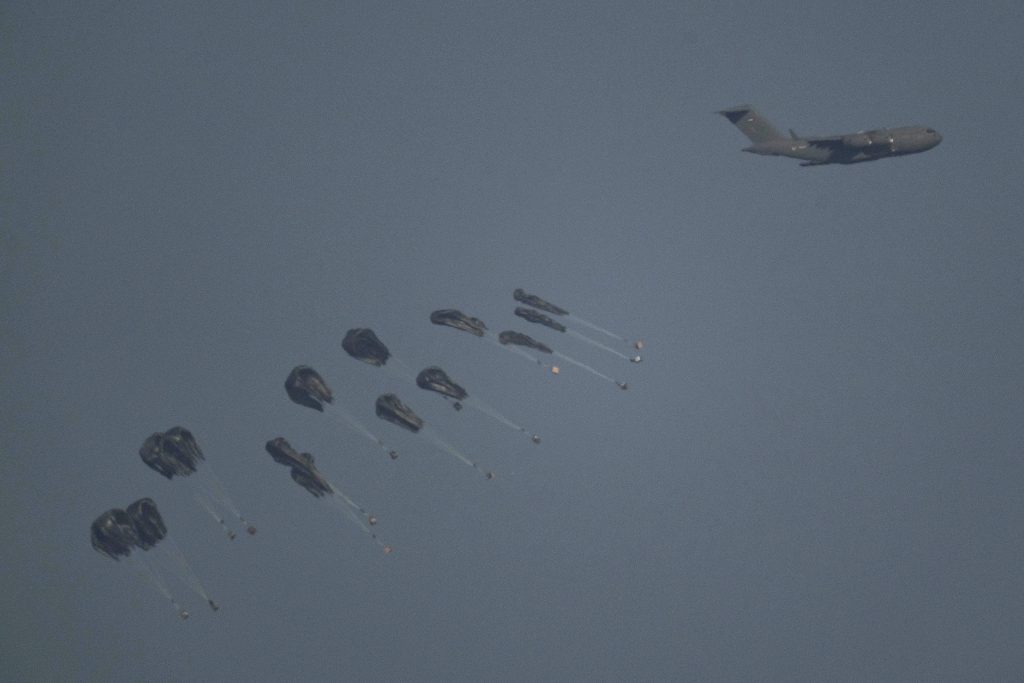THE HAGUE, Netherlands (AP) — The highest court of the United Nations has directed Israel to take action to improve the humanitarian situation in Gaza. This includes opening more land crossings to allow food, water, fuel, and other supplies to enter the war-damaged area.
The International Court of Justice has issued two new temporary measures in a case brought by South Africa accusing Israel of acts of genocide in its military campaign launched after the Oct. 7 attacks by Hamas. Israel denies committing genocide and claims its military campaign is for self-defense and aimed at Hamas, not the Palestinian people.
Hamas has been labeled as a terrorist group by the United States, Canada, and the European Union.
Thursday’s order followed South Africa's request for additional temporary measures, including a cease-fire, due to starvation in Gaza. Israel urged the court not to issue new orders. The court's legally binding order instructs Israel to take action promptly to ensure the unrestricted provision of basic services and humanitarian aid, including food, water, fuel, and medical supplies.
It also directs Israel to immediately ensure that its military does not take actions that could harm Palestinians’ rights under the Genocide Convention, particularly by preventing the delivery of humanitarian aid.
Additionally, the court instructed Israel to provide a report on its implementation of the orders in a month.
Israel declared war in response to a bloody cross-border attack by Hamas on Oct. 7, resulting in 1,200 deaths and 250 people taken hostage. Israel responded with a campaign of airstrikes and a ground offensive that have left over 32,000 Palestinians dead, according to local health authorities. The fighting also displaced over 80% of Gaza’s population and caused widespread damage.
The U.N. and international aid agencies have stated that nearly the entire Gaza population is struggling to obtain enough food, with hundreds of thousands of people on the verge of famine, particularly in hard-hit northern Gaza.
South Africa welcomed Thursday’s decision, describing it as “significant.” The Palestinian Foreign Ministry thanked South Africa, calling the case “a vital step in the global effort to hold Israel accountable for perpetrating genocide.”The Israeli Foreign Ministry had no immediate comment.
In a written response earlier this month to South Africa’s request for more measures, Israel said the claims by South Africa were “wholly unfounded,” “morally repugnant” and “an abuse of the Genocide Convention and of the Court itself.”
After initially sealing Gaza’s borders at the beginning of the war, Israel began allowing entry of humanitarian supplies. It states that there are no restrictions on the amount of humanitarian aid allowed into Gaza and accuses the United Nations of not properly organizing the deliveries.
The United Nations and global aid organizations say that Israeli military limitations, continuing hostilities, and the breakdown of public order have hindered the deliveries.
Israel has been collaborating with international partners to create a plan for starting to transport aid by sea soon.
Israel has frequently clashed with the United Nations, especially UNRWA, the U.N. agency for Palestinian refugees and primary provider of aid in Gaza. Israel accuses the agency of tolerating and even cooperating with Hamas, a claim UNRWA denies.
The court stated in its ruling that 'Palestinians in Gaza are no longer facing only a risk of famine… but that famine is setting in.' It referred to a report from the United Nations Office for the Coordination of Humanitarian Affairs indicating that at least 31 people, including 27 children, have already died from malnutrition and dehydration.
The world court previously stated that the orders imposed on Israel after significant hearings in South Africa’s case 'do not fully address the consequences arising from the changes in the situation' in Gaza.
On Tuesday, the army announced that it inspected 258 aid trucks, but only 116 were distributed within Gaza by the U.N.
COGAT, the Israeli military body responsible for Palestinian civilian affairs, has also conducted trial programs to check the humanitarian aid at Israel’s main checkpoints in the south and then utilize land crossings in central Gaza to attempt to bring aid to the devastated northern part of the Strip. The agency had no immediate comment on the ICJ ruling.
In its legally binding order, the court instructed Israel to take measures 'without delay.'
The world court said earlier orders imposed on Israel after landmark hearings in South Africa’s case “do not fully address the consequences arising from the changes in the situation” in Gaza.
On Tuesday, the army said it inspected 258 aid trucks, but only 116 were distributed within Gaza by the U.N.
COGAT, the Israeli military body in charge of Palestinian civilian affairs, has also run pilot programs to inspect the humanitarian aid at Israel’s main checkpoints in the south and then use land crossings in central Gaza to try to bring aid to the devastated northern part of the Strip. The agency had no immediate comment on the ICJ ruling.









